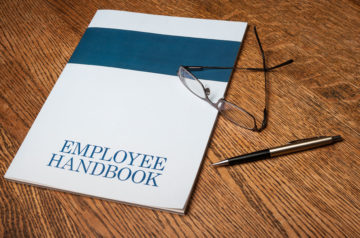
NLRB General Counsel Memo Provides Updated Guidance on Common Employer Work Rules In Light of Boeing
On June 6, 2018, the National Labor Relations Board’s (NLRB) general counsel (GC) issued a new guidance memorandum (GC Memo 18-04) that contains updated guidance on how the regional offices should be reviewing and interpreting unfair labor practice charges involving employer handbook language and work rules. The guidance in the memorandum expounds on the NLRB’s recent pro-management decision in The Boeing Company, 365 NLRB No. 154, which the NLRB issued on December 14, 2017, in which the Board announced a new standard for analyzing whether a work rule violates employees’ rights under the National Labor Relations Act (NLRA).
The Boeing Decision
The memorandum further explains the new Boeing standard, focusing on the balance between a work rule’s negative impact on “employees’ ability to exercise their Section 7 rights and the rule’s connection to employers’ right to maintain discipline and productivity in their workplace.” In Boeing, the Board delineated three categories of employment policies, rules, and handbook provisions:
- “Category 1 will include rules that the Board designates as lawful to maintain, either because (i) the rule, when reasonably interpreted, does not prohibit or interfere with the exercise of NLRA rights; or (ii) the potential adverse impact on protected rights is outweighed by justifications associated with the rule.”
- “Category 2 will include rules that warrant individualized scrutiny in each case as to whether the rule would prohibit or interfere with NLRA rights, and if so, whether any adverse impact on NLRA-protected conduct is outweighed by legitimate justifications.”
- “Category 3 will include rules that the Board will designate as unlawful to maintain because they would prohibit or limit NLRA-protected conduct, and the adverse impact on NLRA rights is not outweighed by justifications associated with the rule.”
The GC Memo
In the memorandum, the general counsel analyzes several examples of common employer rules and provides guidance to the regional offices regarding the placement of such rules into the three Boeing categories and determining whether or not a complaint should be issued.
As set forth in the memorandum, Category 1 rules are generally lawful and regional directors should dismiss any such charge absent withdrawal. Category 1 rules include the following:
- Civility Rules. A prohibition on “[b]ehavior that is rude, condescending or otherwise socially unacceptable” is an example of a lawful civility rule.
- No Photography or Recording Rules. A rule that prohibits the use of cameras or other recording devices is an example of a lawful rule.
- Insubordination Rules. A rule that states “‘[b]eing uncooperative with supervisors . . . or otherwise engaging in conduct that does not support the Employer’s goals and objectives’ is prohibited” is an example of a lawful insubordination rule.
- Disruptive Behavior Rules. A prohibition against “[c]reating a disturbance on Company premises or creating discord with clients or fellow employees” is an example of a lawful disruptive behavior rule. However, employers may want to exercise care when using disruptive behavior rules to discipline employees for strikes or walkouts.
- Confidentiality Rules. Rules banning the discussion of confidential, proprietary, or customer information that make no mention of employee or wage information are generally lawful. “Do not disclose confidential financial data, or other non-public proprietary company information” is an example of a lawful rule.
- Rules Against Defamation or Misrepresentation. A rule against “[m]isrepresenting the company’s products or services or its employees” is a lawful rule.
Category 2 rules require an evaluation of the rule on a case-by-case basis using the Boeing standard. Category 2 rules include:
- “Broad conflict-of-interest rules that do not specifically target fraud and self-enrichment . . . and do not restrict membership in, or voting for, a union
- Confidentiality rules broadly encompassing ‘employer business’ or ‘employee information’ (as opposed to confidentiality rules regarding customer or proprietary information . . . or confidentiality rules more specifically directed at employee wages, terms of employment, or working conditions . . . )
- Rules regarding disparagement or criticism of the employer (as opposed to civility rules regarding disparagement of employees . . . )
- Rules regulating use of the employer’s name (as opposed to rules regulating the employer’s logo/trademark . . . )
- Rules generally restricting speaking to the media or third parties (as opposed to rules restricting speaking to the media on the employer’s behalf . . . )”
Category 3 rules are unlawful to maintain. Category 3 rules include:
- confidentiality rules specifically regarding wages, benefits, or working conditions (for example, a rule stating employees are prohibited from disclosing salaries or the contents of employment contracts is unlawful); and
- rules against joining outside organizations or voting on matters concerning the employer.
The memorandum also advises the regional offices that they should no longer find unlawful any rule that could be interpreted as covering Section 7 activity and should now focus on whether the rule in question would actually be interpreted to cover Section 7 activity. The memorandum also instructs regional offices that “ambiguities in rules are no longer interpreted against the drafter, and generalized provisions should not be interpreted as banning all activity that could conceivably be included.”
Takeaways
In light of the NLRB’s decision in Boeing and the corresponding GC Memo 18-14, employers may wish to revise or add new language to handbooks and policies to take advantage of the NLRB’s more employer-friendly posture on these issues.
By: Christopher R. Mikula @ Ogletree Deakins



